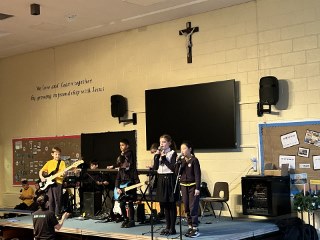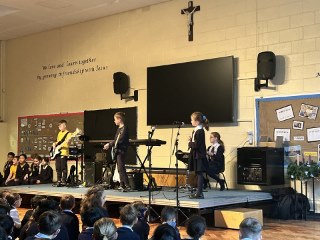Music
- Music Concert (December 2025)
- Music Concert (February 2025)
- Music Concert (December 2023)
- Music Concert (June 2023)
- Music Concert (March 2023)
- Music Concert (December 2022)
Rocksteady Rockband performers - December 2025 and link to ITV Central News showcase




Music Intent
Music and singing is integral to the life of a St Augustine’s pupil. We provide a vibrant musical experience for all children to create, play, perform and enjoy music, to develop the skills, to appreciate a wide variety of musical forms, and to begin to make judgements about the quality of music. Through our music curriculum, pupils will gain enjoyment, self-confidence and a sense of achievement. They will be aware of, understand and respond appropriately to the rich variety of sounds in their environment and particularly to those organised arrangements of sounds called music. They will acquire musical skills and understanding of musical concepts through active listening, then performing and composing. They will also develop their capacity to express ideas and feelings through the medium of sound.
Music Implementation
At St Augustine’s we deliver a clear and comprehensive scheme of work in line with the National Curriculum through Charanga. This is a scheme of work, which offers a topic-based approach to support children’s learning in music. A steady progression plan has been built into Charanga, both within each year and from one year to the next, ensuring consistent musical development. By using Charanga as the basis of a scheme of work, we can ensure that they are fulfilling the aims for musical learning stated in the National Curriculum. Charanga includes many examples of music styles and genres from different times and places. These are explored through the language of music via active listening, performing and composing activities, which enable understanding of the context and genre. There is a classroom-based, participatory and inclusive approach to the music learning. Throughout the scheme, children are actively involved in using and developing their singing voices, using body percussion and whole-body actions, and learning to handle and play classroom instruments effectively to create and express their own and others’ music. Through a range of whole class, group and individual activities, children have opportunities to explore sounds, listen actively, compose and perform. During music lessons, children will be given opportunities to learn music specific vocabulary in a meaningful context and will be given opportunities to apply skill and be given the chance for collaboration through composition. Year 4 learn to play Recorders throughout the year, facilitated by Solihull Music Service; while in other year groups children benefit from playing the glockenspiel. Year 5 participate in Young Voices, bringing together thousands of children from schools across the country to form one of the largest school choirs in the world. It’s a wonderful opportunity for pupils to experience the joy of singing as part of a huge choir, perform alongside professional musicians, and build confidence through music. Extra-curricular clubs, linked to Rocksteady Band (Tuesday mornings) are delivered by a specialist music teacher, which enhances the curriculum offer. The school also enable peripatetic lessons to take place across the year, delivered by Solihull Music Service - guitar, violin and keyboard. Concerts and events take place throughout the year to further inspire pupils and develop their musical and cultural abilities, whilst providing them with a platform for performance.
Music Impact
All pupils will benefit from a high-quality music education which engages and inspires them to develop a love of music and their talent as musicians. It will increase their self-confidence, creativity and sense of achievement. As pupils progress, they will develop a growing musical vocabulary that allows them to critically engage with music. Teaching and learning of music is a reflective process for the children as they are given the opportunities to assess themselves and their peers. The children also celebrate their success and skills with their peers and wider audiences.
Evidence of pupils’ work is recorded through photographs, videos, audio recordings and, where appropriate, written work. Teachers make formative judgements in lessons as they observe pupils working, and adapt subsequent lessons to ensure individual children’s needs are addressed. Pupil’s learning and understanding is assessed against the appropriate Charanga year group’s knowledge and skills progression map, which directly links to the National Curriculum statements for music. Children’s effort is reported to parents and attainment is input onto Insight platform for subject leaders to assess and share an overview with the Music link Governor. Subject Leaders will carry out learning walks, observations and pupil interviews. Monitoring and assessment evidence is used to establish curriculum impact.
